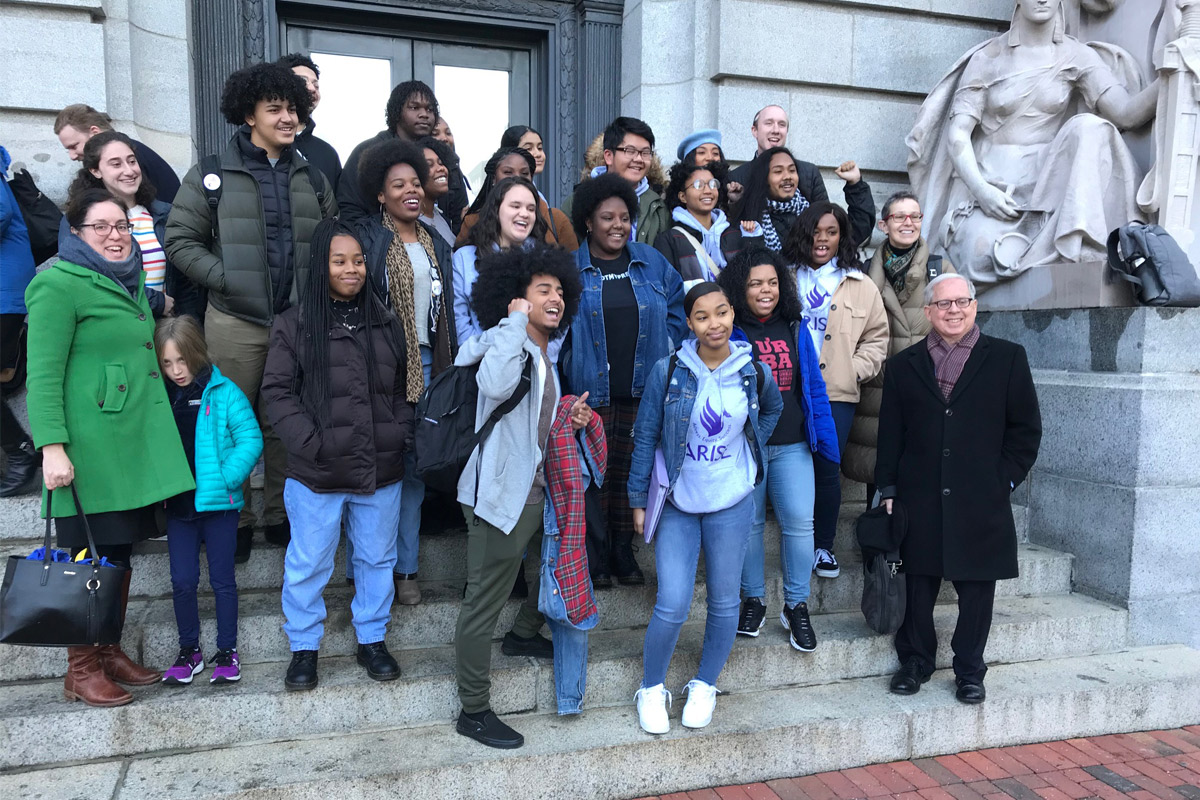Attorneys for the state of Rhode Island conceded in Federal Court on Thursday that, under some “extreme” circumstances, the federal constitution may provide students a right to education. The concession came under questioning from Chief Judge William E. Smith, the federal judge overseeing an important education rights lawsuit filed by students and their parents.
Filed last November in Rhode Island, the lawsuit asserts that American students have a right under the U.S. Constitution to an education that prepares them to be capable citizens. While hearing oral arguments on the state’s motion to dismiss from both sides in the case, Judge Smith questioned the state’s position that education is not protected by the federal constitution under any circumstances.
An online summary of the lawsuit says it was filed “amid some very troubling trends” in American democracy, including “the extreme polarization of the electorate; the dismissal of people with opposing views; the failure of many voters (and, quite often, the candidates) to focus on substantive policy issues; and the widespread acceptance and circulation of one-sided and factually erroneous information.”
In a hearing room overflowing with students and parents, Smith posed a hypothetical situation: If a state chose to close all public schools within its boundaries, would that not be a constitutional violation of students’ rights? Counsel for the defendants replied that in such an “extreme situation,” the federal constitution might protect students. Attorneys for the plaintiffs noted that this is at odds with the state’s hard and fast position in this case thus far that education is exclusively a local and state matter and is not in any way protected by the federal constitution.
“That got straight to the heart of the matter,” said Michael Rebell, a professor of education and law at Teachers College, Columbia University, Executive Director of the Center for Educational Equity, and lead attorney for the plaintiffs in the lawsuit. Rebell has spent decades trying education equity cases and won a $9 billion funding equity case in New York City. Co-counsel on the matter are Jennifer Wood, executive director of the Rhode Island Center for Justice; Samuel Zurier and Stephen Robinson, two attorneys who previously brought education rights cases in Rhode Island under the Rhode Island state constitution.
Rebell told the Court that the state’s concession should be “dispositive for the motion to dismiss” – that is, if it is acknowledged that there is indeed some right to education under the federal constitution, then the case should proceed to trial to determine the scope of that right and whether the State of Rhode Island is currently violating it.
Judge Smith is not under a deadline to rule on the matter, but Rebell said that based on his experience in other cases, the judge may rule within several months, either granting the state’s motion to dismiss the case or allowing the matter to go to trial. Rebell said that ultimately the matter may be appealed to the Supreme Court, so that the highest court in the land could rule on the question and make clear whether all students across the country will be guaranteed an education sufficient to enable them to, for example, vote, serve on a jury, or engage in local political affairs.

Michael Rebell, Professor of Law & Educational Practice and Executive Director of TC’s Center for Educational Equity (Photo: TC Archives)
One question by the judge did suggest he may be skeptical about how a federal guarantee, if it is affirmed in the law, would be enforced. He noted that federal enforcement of the desegregation of public schools, for example, involved the federal government in constant monitoring and years of oversight. Rebell responded that there have been other educational rulings by the federal courts, such as the ruling that there are some limitations on the constitutional right of free speech in the school setting, which states and local school districts have been able to implement without extensive supervision by federal courts.
An online summary of the lawsuit says it was filed “amid some very troubling trends” in American democracy. These include “the extreme polarization of the electorate; the dismissal of people with opposing views; the failure of many voters (and, quite often, the candidates) to focus on substantive policy issues; and the widespread acceptance and circulation of one-sided and factually erroneous information.” During the hearing, the judge reaffirmed this last point by noting the release on December 3 of results from the Program for International Student Assessment, which indicated that only 14 percent of American 15-year-olds were able to distinguish between fact and opinion in written texts.
The summary notes “other disturbing factors [that] have been present for decades,” including low voter participation in elections compared with other developed countries, a dramatic decline in the number of citizens who actively participate in local community activities, and increasing neglect of “basic civic responsibilities like jury service.”
These deficiencies raise questions about how well the nation’s public schools are doing in fulfilling one of their basic mandates: preparing American students to actively participate in and sustain the nation’s democratic institutions and processes. Litigants in the Rhode Island lawsuit hope to change that, for students across the country.
— Patricia Lamiell
Additional coverage:
Students Press Unusual Argument in Court: a Constitutional Right to Civics (via The Wall Street Journal - Subscription Required)
Rhode Island student: ‘I don’t have civics education’ (via EducationDive)
R.I. sued over lack of civics education in schools (via Providence Journal)
